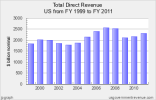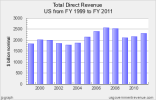Accountable
Well-Known Member
Does anybody believe this really is a "cliff"? If it was really serious, they would (will?) just extend the deadline.
What Is the Fiscal Cliff? - Council on Foreign Relations
What Is the Fiscal Cliff? - Council on Foreign Relations
What are the components of the fiscal cliff?
The following set of revenue and spending measures are set to expire or take effect at year's end, representing an acute fiscal consolidation that could be further intensified by a potential showdown over the debt ceiling.
Revenue Increases
2001/2003/2010 Tax Cuts & AMT Patch. This series of legislation, often referred to collectively as the "Bush tax cuts," will expire on December 31, 2012, raising all income tax rates (top will go from 35 to 39.6 percent), as well as rates on estate and capital gains taxes. The alternative minimum tax (AMT) will also automatically apply to millions more citizens.
Payroll Tax Cut. The Social Security payroll tax holiday will expire December 31, raising the rate from 4.2 to 6.2 percent.
Other Provisions. Several other policies such as the Research and Experimentation tax credit, many of which are typically enacted retroactively, are due to sunset at years' end.
Affordable Care Act Taxes. Some provisions in the Obama health-care legislation, including increased tax rates on high-income earners, are set to take effect in January 2013.
Spending Cuts
Budget Control Act. The automatic spending cuts or sequester legislated by the Budget Control Act of 2011 will hit January 2. Half of the scheduled annual cuts ($109 billion/year from 2013-2021) will come directly from the national defense budget, half from non-defense. However, some 70 percent of mandatory spending will be exempt.
Extended Unemployment Benefits. The eligibility to begin receiving federal unemployment benefits, last extended in February, will expire at year's end.
Medicare "Doc Fix." The rates at which Medicare pays physicians will decrease nearly 30 percent on December 31.
Debt Ceiling
The debt limit, which sets the maximum amount of outstanding federal debt the U.S. government can incur by law, is currently capped at $16.39 trillion. Treasury is expected to hit this borrowing capacity again sometime in early 2013. Analysts fear another protracted debate over the debt ceiling could bring repercussions similar to those that followed the debt battle in summer of 2011, which rattled financial markets and, according to a study from the Government Accountability Office, raised the cost of Treasury's borrowing by $1.3 billion for FY2011.









